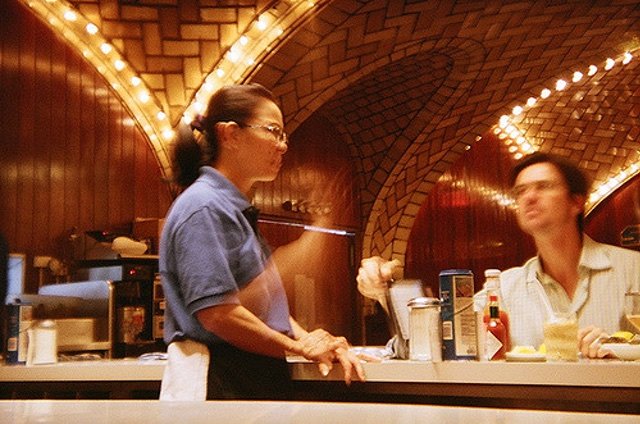NYC Restaurants 'Thriving' While Paying $15 Minimum Wage, Study Finds
Aug. 7, 2019, 4:19 p.m.
"It's hard to look at the comprehensive data we did and not understand that many, many restaurants have effectively adapted to the rising minimum wage. Not everyone, but the vast majority."

Despite apocalyptic warnings from restaurateurs that a $15 minimum wage would ruin business, a new study suggests that higher earnings for employees haven't actually hurt the hospitality industry—in fact, the city's eateries overall are "thriving."
James Parrott, director of economic and fiscal policies at the New School's Center for New York City Affairs, research assistant Lina Moe, and the National Employment Law Project's researcher and policy analyst Yannet Lathrop looked at government data on employment and wages in their multi-pronged analysis of New York City's restaurant scene. According to their report, the industry witnessed "a strong economic expansion" as wages grew between 2013 and 2018—even amid rising rents and flourishing third-party delivery services, which cut into restaurant profits.
"Contrary to fears of massive job losses, $20 Big Macs, and shuttered restaurants, we found a thriving industry," the study's authors stated in a press release.
In terms of employment, pay, and the number of both limited- and full-service establishments, the analysis indicated that NYC's hospitality sector has "substantially" outpaced private sector job growth nationwide since its minimum wage ratcheted up from $7.25 an hour at the end of 2013 to $15 an hour by the end of 2018. Especially in Queens, the Bronx, Brooklyn, and Staten Island, restaurants experienced higher job and wage growth—a significant finding, the authors note, because spending by tourists and "generally higher-income patrons" tends to cluster in Manhattan. In the outer boroughs, full-service restaurants reportedly proliferated at a rate three times as fast as in Manhattan.
In comparison to other large cities that have not undertaken a minimum wage hike, NYC's restaurant industry appears particularly healthy. The authors looked at 12 of these cities, all with populations over 500,000 people, and found that with three exceptions—Nashville, Tennessee; Charlotte, North Carolina; and Dallas, Texas—New York charted higher rates of employment growth in its limited- and full-service establishments. Those restaurants also registered higher weekly wage growth, which makes sense considering the context. But as the authors point out, research on other cities that have raised the minimum wage suggests that doing so did not negatively affect the industry's growth.
In New York, Parrott told Gothamist, raising the minimum wage meant that restaurant workers saw a 20 to 28 percent increase in their pay, adjusted for inflation—"the largest real increases for a big group of low-wage workers since the 1960s."
Still, the authors were careful to note that a $15 minimum wage isn't responsible for whatever boon the NYC restaurant scene has recently experienced—rather, their findings suggest that restaurants are doing just fine despite the obligation to pay their hourly workers more money. According to the study, NYC's restaurants have increased sales by an annual 6.6 percent starting in 2014, netting almost $22 billion by 2018.
Of course, small business owners and restaurateurs have complained that a higher minimum wage obligates them to cut corners elsewhere if they want to keep operations afloat. According to a 2018 survey by the NYC Hospitality Alliance, many restaurants have raised prices (according to today's study, those increases have amounted to an average of "less than three percent a year since the minimum wage started to rise"), and some employers have scaled back employee hours and overtime. Nearly 50 percent of respondents to the Hospitality Alliance's survey said they would have to eliminate jobs in 2019 to make do.
Wednesday's study casts doubt on that survey's methodology, however, noting that the details were never made public. The picture the authors see when analyzing "data on employment and wages for every single restaurant operating in NYC" looks different, Parrott told Gothamist.
"The restaurant industry is very competitive," he said. "Some individual restaurants always do better than others, and some inevitably fall by the wayside," he added, nodding to acknowledged industry difficulties, including the expensive NYC real estate hellscape and a strengthened dollar that weakens tourist spending. Even taking those caveats into consideration, Parrott concluded, "It's hard to look at the comprehensive data we did and not understand that many, many restaurants have effectively adapted to the rising minimum wage. Not everyone, but the vast majority."